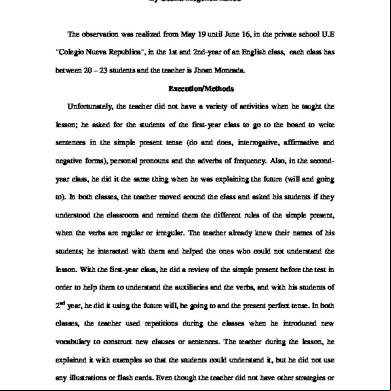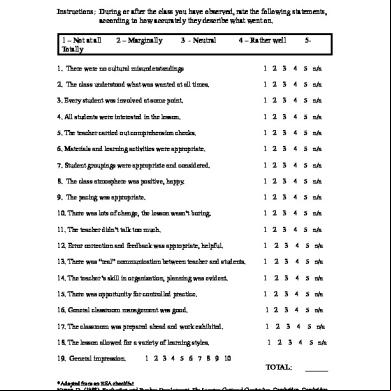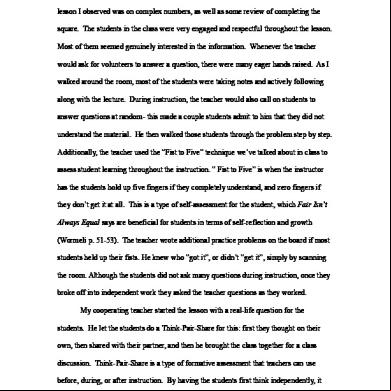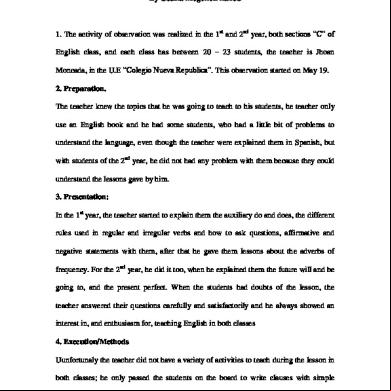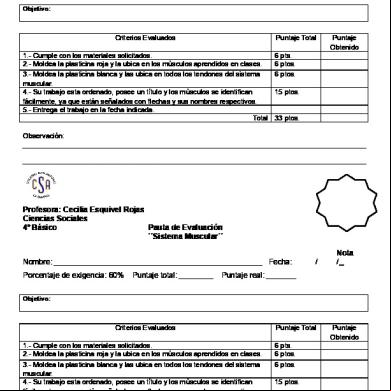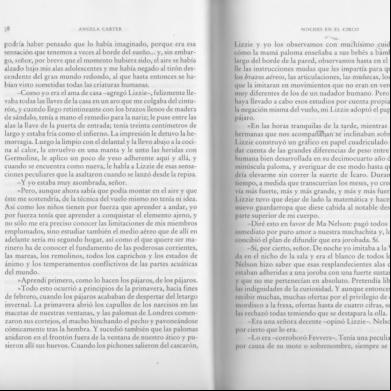Classroom Observation Report2 715a1f
This document was ed by and they confirmed that they have the permission to share it. If you are author or own the copyright of this book, please report to us by using this report form. Report 3i3n4
Overview 26281t
& View Classroom Observation Report2 as PDF for free.
More details 6y5l6z
- Words: 499
- Pages: 2
CLASSROOM OBSERVATION REPORT By Cecilia Mogollon Abreu
The observation was realized from May 19 until June 16, in the private school U.E "Colegio Nueva Republica", in the 1st and 2nd-year of an English class, each class has between 20 – 23 students and the teacher is Jhoan Moncada. Execution/Methods Unfortunately, the teacher did not have a variety of activities when he taught the lesson; he asked for the students of the first-year class to go to the board to write sentences in the simple present tense (do and does, interrogative, affirmative and negative forms), personal pronouns and the adverbs of frequency. Also, in the secondyear class, he did it the same thing when he was explaining the future (will and going to). In both classes, the teacher moved around the class and asked his students if they understood the classroom and remind them the different rules of the simple present, when the verbs are regular or irregular. The teacher already knew their names of his students; he interacted with them and helped the ones who could not understand the lesson. With the first-year class, he did a review of the simple present before the test in order to help them to understand the auxiliaries and the verbs, and with his students of 2nd year, he did it using the future will, be going to and the present perfect tense. In both classes, the teacher used repetitions during the classes when he introduced new vocabulary to construct new clauses or sentences. The teacher during the lesson, he explained it with examples so that the students could understand it, but he did not use any illustrations or flash cards. Even though the teacher did not have other strategies or techniques to give the lessons, so he only used an English book to explain the lessons
such as adverbs of frequency, in this case, he explained the structure of each adverb and applied examples in the real context of his students and their personal experiences, and for example I always eat arepas, also when the students participated in the class, some of them pronounced badly the vocabulary and wrote a lot of mistakes like sentences in third person in singular they used first person in the singular, especially their mistakes when they wrote the verbs, or the personal pronouns and the teacher always corrected and repeated until they could understand that they have to apply the rules gave by him. In both classes, there were not any changes in the way to teach the lessons. If I were the teacher, I would use more strategies or techniques like role-plays, songs, creative writing, lectures to help them to improve their skills (listening, speaking, writing, and reading) even the technology (videos, educative games) in order to reinforce the students’ learning. I could not use the same approach because the students get bored and they do not want to learn. They want something new, something enthusiastic, which motivates them to want to learn the language.
The observation was realized from May 19 until June 16, in the private school U.E "Colegio Nueva Republica", in the 1st and 2nd-year of an English class, each class has between 20 – 23 students and the teacher is Jhoan Moncada. Execution/Methods Unfortunately, the teacher did not have a variety of activities when he taught the lesson; he asked for the students of the first-year class to go to the board to write sentences in the simple present tense (do and does, interrogative, affirmative and negative forms), personal pronouns and the adverbs of frequency. Also, in the secondyear class, he did it the same thing when he was explaining the future (will and going to). In both classes, the teacher moved around the class and asked his students if they understood the classroom and remind them the different rules of the simple present, when the verbs are regular or irregular. The teacher already knew their names of his students; he interacted with them and helped the ones who could not understand the lesson. With the first-year class, he did a review of the simple present before the test in order to help them to understand the auxiliaries and the verbs, and with his students of 2nd year, he did it using the future will, be going to and the present perfect tense. In both classes, the teacher used repetitions during the classes when he introduced new vocabulary to construct new clauses or sentences. The teacher during the lesson, he explained it with examples so that the students could understand it, but he did not use any illustrations or flash cards. Even though the teacher did not have other strategies or techniques to give the lessons, so he only used an English book to explain the lessons
such as adverbs of frequency, in this case, he explained the structure of each adverb and applied examples in the real context of his students and their personal experiences, and for example I always eat arepas, also when the students participated in the class, some of them pronounced badly the vocabulary and wrote a lot of mistakes like sentences in third person in singular they used first person in the singular, especially their mistakes when they wrote the verbs, or the personal pronouns and the teacher always corrected and repeated until they could understand that they have to apply the rules gave by him. In both classes, there were not any changes in the way to teach the lessons. If I were the teacher, I would use more strategies or techniques like role-plays, songs, creative writing, lectures to help them to improve their skills (listening, speaking, writing, and reading) even the technology (videos, educative games) in order to reinforce the students’ learning. I could not use the same approach because the students get bored and they do not want to learn. They want something new, something enthusiastic, which motivates them to want to learn the language.
